Source: The Conversation (Au and NZ) – By Kevin John Brophy, Emeritus Professor of Creative writing, University of Melbourne
A friend is sending me documents needed to make me the executor of his will. He does not expect to die from this pandemic but he has enough weaknesses in his body to be fairly sure he would not survive the virus if it gets to him. He is not as old as I am but he is not young either. He is clear-sighted enough to know what he must do now: stay at home. He is also clear-sighted enough to admit into his thinking the common fact of death.
And common fact it is — about 160,000 Australians die in the course of each year —though every death is a particular death and no single death can be quite like another. From a certain distance, it looks as if we must all enter this darkness or this blinding light by the same gate when we die, and from that point of view our common destination is undeniable.
But from another point of view, the one taken in Kafka’s famous parable, Before the Law, each of us stands at a particular gate made for us, a gate no other person can go through. Making a similar point, “Death is a black camel that kneels at every person’s gate”, goes a Turkish proverb.
I am a little shocked by my friend’s matter-of-fact approach to the idea of his death; and I am comforted by his attitude as well. At least he is not leaving matters to bureaucrats or stolid workers who might think his death is much the same as all other deaths.
As a friend, I have always valued him for the no-nonsense realism he brings to bear on our lives, and for the creativity with which he has approached every experience of his life. I tell him I will be happy to sign the documents and, if needed, to act as his executor. He says it will be simple. He has everything in labelled boxes and files.When I talk to another friend who is a doctor at a Melbourne hospital, she speaks of the bruise on her nose from wearing a tight mask all day every day, of the sweating inside her protective plastic garments, of washing and disinfecting her hands after taking off each item of protective clothing at the end of a shift.
She says she thinks it is only a matter of time before she will be infected with the virus. She is young and her chances of survival are high, she says. I am shocked all over again by the way she thinks — or must think if she is to continue to do this work.
Read more: When life is coming to a close: three common myths about dying
This fearful companion
Another day and there are nearly 2,000 people from aged care homes sick with the virus, and a record number of deaths reported for two days running. Grieving families are interviewed on television and on the radio.
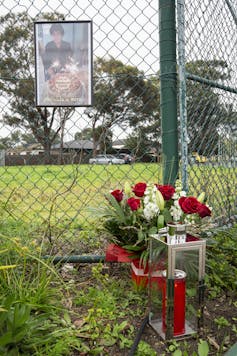
I am living at home now with my death a definite shadow in my mind. I am 70, which makes me vulnerable. Many of us, I know, are in our homes with this fearful companion so full of its own patience and fierce focus.
One mercy is that I don’t have to be worrying about my parents, who both died three years ago after reaching their nineties. Their deaths followed the familiar pattern: a series of falls, an illness that brings pneumonia with it, a descent into morphine assisted sleep, then days of dragging in those last breaths as though they are being counted down.
But their deaths were particular too. My father was exhausted, I believe, and my mother was not ready to go. She fought through to those last breaths with all the fight she had in her.
In 1944 Carl Jung suffered a heart attack after breaking his foot, and was in a coma for three weeks. In a brief memoir of this experience, he describes floating out into near space where he could look down on the planet, then entering a light-filled rock that seemed to be a temple with a room inside where he was sure he would meet all the people who had been important to him, and where he would finally understand what kind of life he had lived.
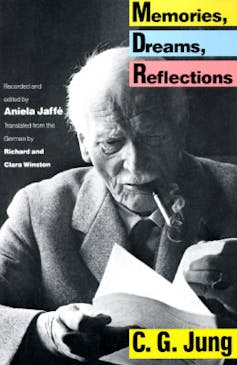
At the entrance to this room, his doctor called him back to earth where there seemed to be a continuing need for his presence. He had to forego the experience of death, he wrote. He was 69 and he would live for another 17 years. For those who were caring for him, he might have looked like any patient in a coma and near death, but for him this was a particular moment of reckoning and even joyous anticipation.
Watching my parents die was its own shock after witnessing the deterioration in their bodies and minds as they aged, the reduction of their lives to a hospital bed, closed eyes, machines attached, the days-long struggle to breathe. It was almost unbearable to be near this and almost impossible to keep away as the time left became shorter.
Now in the time of this virus a painful new imposition bears down upon the families of the dying for they cannot even stand by the bed of a dying parent or grandparent or partner. The sadness of this immeasurable.
In an essay about death, called On Practice, Michel Montaigne mentioned that “practice is no help in the greatest task we have to perform: dying.”
In this matter we are all apprentices. But is there some way of breaking ourselves in for death, or must we always work and work to keep both death and the thought of death at bay?
Read more: Guide to the classics: Michel de Montaigne’s Essays
When my sister died of cancer at 49, I remember her patting our young daughter’s hand the day before she died, saying to her, “Don’t cry, I’ll be all right. I promise you I will be all right.”
At the time I thought she was in denial, or that perhaps she thought that she needed to protect us from the heavy presence of death.
But now I think she might have been looking past us and even past herself: we do die and it is all right — and every living thing that moves only moves under the condition of its coming death. She might have been seeing this well enough to embrace its truth. I don’t know.
‘A second, a minute, longer’
Today the sun was out, a low winter sun sparkling through the twisted branches of our back yard ornamental pear trees, and I could not resist going out into the sunshine to weed around the carrots and beetroot, and take up the last of the autumn leaves from under the parsley bushes. I felt lucky to have these few minutes with the warmth of the sun on the back of my neck.
I have been reading Svetlana Alexievich’s Chernobyl Prayer, and somewhere near the end she records the words of a physicist dying of cancer from the Chernobyl fallout. He said,
I thought I only had days, a very few days, left to live, and I desperately wanted not to die. I was suddenly seeing every leaf, bright colours, a bright sky, the vivid grey of tarmac, the cracks in it with ants clambering about in them. ‘No,’ I thought to myself, ‘I need to walk round them.’ I pitied them. I did not want them to die. The aroma of the forest made me feel dizzy. I perceived smell more vividly than colour. Light birch trees, ponderous firs. Was I never to see this anymore? I wanted to live a second, a minute longer!
This reaction is deeply understandable, and each of us shares this feeling, even if only faintly, every morning that we find we have the world in our world again — for perhaps a whole day. Each time I read that paragraph I misread “I desperately wanted not to die” as “I desperately wanted to die”.
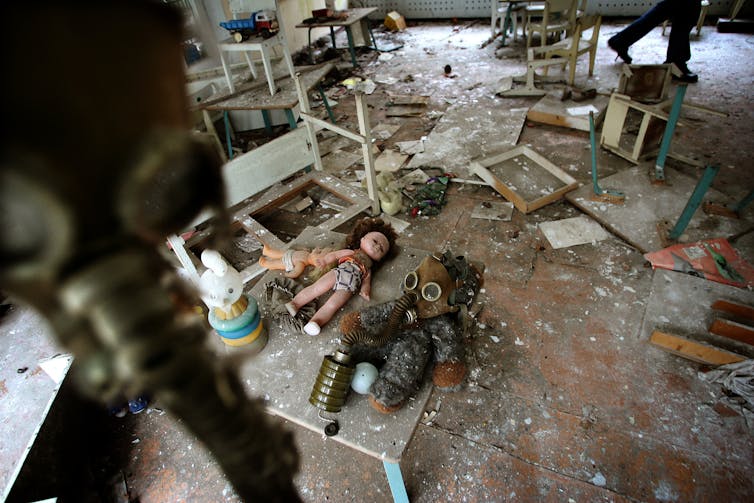
This urge to stay at home is almost matched by the urge to be out in the world rubbing shoulders with crowds. The desire to save my own life is mixed somehow with a desire to have it over with. My misreading troubles me, but it keeps happening.
A woman I know who is 30 years old answers, when I ask her how she feels about the growing numbers of aged victims to this pandemic, that there need to be more public “death-positive” campaigns in order to make death a more natural part of life in our culture — to make of it something we need not fear so much or become so angry over.
Though she speaks as if death belongs to other kinds of being than her, she makes some good sense because this is the other side of our attitude to death. Sometimes I lie in bed and count the likely number of days I might have left to me, and it always seems both a lot and not enough. And then I forget what the number was because after all, how can there even be a world without me in it?
Some years ago our dear neighbour Anna said she had decided it was time for her to die. There was nothing else she wanted. We had watched her nurse her husband through dementia for a decade, we had many afternoon teas with her as she fussed over our children and showed us the latest thousand-piece jigsaw puzzle she was completing. She talked about the books she was reading. And then one day she was ready to go.
Not long after that I visited her, more or less unconscious in a hospital bed. My amazement at her decision to go. But now, as I inch closer to old age, I imagine I might be able to understand how her decision was as much a matter of the mind as the body.
An American news service has reported that across 24 hours one person every minute died in the United States from Covid-19. I am not sure how to understand this kind of counting. It conjures images of queues of bodies, of frantic funeral directors and grieving families. It speeds up the mind and produces in me a feeling of panic.
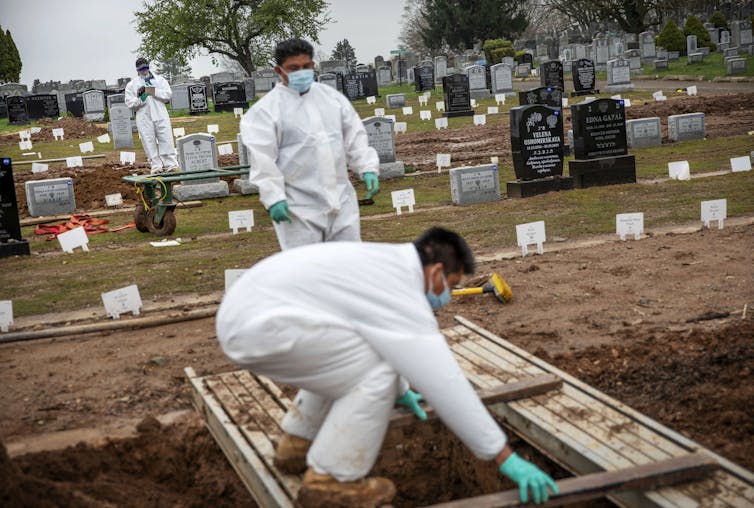
Every minute across each day of the year about seven babies are born in the USA. A lot happens in a minute across a whole nation. Numbers tell a certain kind of story, the heart tells another, but sometimes the numbers are aimed at the heart.
If not death-positive, then perhaps we could be death-realistic. Svetlana Alexievich talked to children in cancer wards. A dying child named Oxana spoke of what she desired: “When I die, don’t bury me in a graveyard. I’m afraid of cemeteries. There are only dead people there, and crows. Bury me in open countryside.”
It is possible to know we are afraid, and know at the same time that this fear is a fear up to the brink of death, and beyond that we can go with our imaginations into an open countryside.
I am afraid, as we all are. When my daughter asks what she should do with my ashes after I am gone, the fiction we play at is that I will care what happens to “my” ashes, that it will make a difference to me, and that “I” will still be somewhere when she makes that decision.
I can never compose a clear set of instructions for her, though I know that putting those ashes somewhere in nature, perhaps out on water or under a tree, would fit with an idea I have of how the journey is best completed.
Intense light
With a state of disaster formally declared and a curfew at night for all the citizens of our city, the word, “disaster”, might seem to mark an endpoint. But it has become the sign for a new beginning and a new campaign.
With these new plans in place, drastic though they are, the possibility opens for believing, perhaps naively, that there will be a time when death does not dominate our thinking, that the virus will be a memory of a time we negotiated, a dark passage of intense narrowness before coming out of it into an open countryside. Perhaps as faltering human beings we must live this way: repeatedly imagining in hope of further scenes of rebirth.
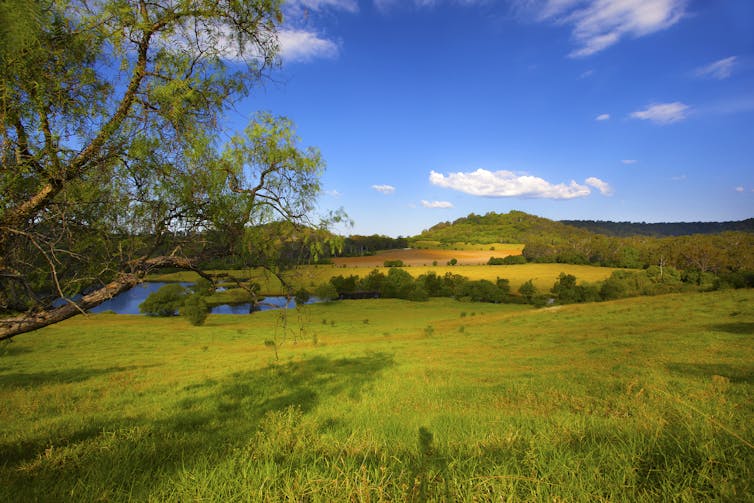
When we know as fully as it can be known that we are each on a sure way to our own particular death, perhaps then we are already in that open countryside. My partner Andrea and I walked in the sunshine today to a park where we met, briefly, with our son, who stood well away from us, all of us in masks.
We talked about everything that is small, inconsequential, funny and ordinary in our lives. Two of us will have birthdays under this extended lockdown. We did not mention death, but everything we said was bathed in its intense light.
Our duties
I receive emails offering support and good wishes from friends interstate and around the world for the six weeks of lockdown. There is a shift in attitude and mood away from blame and towards support. We have a difficult time ahead of us. The street falls still and silent at night. I have a list of books to read, old papers to go through and throw out, but before that I find I wake up ill.
When I ring a doctor friend for advice he tells me he is COVID-19 positive himself, contracted in one of Melbourne’s aged care homes, and is in quarantine at home for two weeks. So far, into day six, he is feeling not too bad. In anticipation of this he says he has been keeping fit, eating well, and taking zinc tablets. My friend advises me to go to an emergency ward at a nearby hospital, and I do, though with much nervousness.
I am the only person in the emergency waiting area when I arrive, and am soon inside with a nurse in a cubicle, having urine and blood tests. Everyone is in plastic, masked, and across the aisle from me there are three police officers guarding a prisoner with shackles at his ankles and one arm pinned by a padlock to a wide leather belt. All three police are masked and one wears bright orange ocean swimming goggles as well.
In the emergency centre, I feel that I am both in the midst of an unfolding crisis and present at a theatre-in-the-round performance. A woman in a wheelchair asks loudly what everyone’s name is and what their job is. When one man says he is the director of the emergency centre she laughs loud and long, as though she has somehow caught the biggest fish in the river and doesn’t believe it.
Someone asks her if she wants some lunch, and she announces that she is starving and could they make up a bacon and fried egg sandwich for her followed by a crunchy peanut butter sandwich.
I am released from the emergency ward with blood and urine samples left for analysis, but without being tested for COVID-19 because I showed no specific symptoms.
Read more: ‘I want to stare death in the eye’: why dying inspires so many writers and artists
My time in the hospital is a reminder to me of how far I am from the world now. A workplace, I realise afresh, can be dizzyingly busy, chaotic, packed with humanity and with unpredictable moments of basic care for fellow humans, of suffering, and those bizarre sights worthy of a circus or an opera. I have become so used to moving between two or three rooms at home and going outside only to go into the garden, that I am in a panic here in the hospital over doorknobs, sheets, chairs or curtains that I’m touching — and at the same time I feel that this closeness to others is what being alive is really about.
Returning home I have to keep reminding myself that it is in this quiet, almost passive way of living that I am doing something needed. It might be that this social isolation, one from another, is a plague response from the middle ages, but without it, we are told, modern hospitals, ventilators and ICUs will be overwhelmed. There is an intimate, human response needed to this virus. It forces an honesty upon us.
If this social isolation is now one of life’s duties, it goes along beside all the other duties, and among them is the fact that dying is one of our duties. This is an old thought, and perhaps a pagan thought.
Seneca the Younger wrote of this duty in the first century of the Christian era. Would it be too heartless to say that in the presence of so much death and illness we might now be capable of being driven into a new and eerie awareness of what it is like to be alive?
I can envy the vivid, raw consciousness of the man Alexievich quoted, the man who “desperately wanted not to die”, while feeling something desperately hopeless for him too. Perhaps a part of this being alive to dying is being able to hold and carry more than one feeling at once, and especially the contradictory feelings.
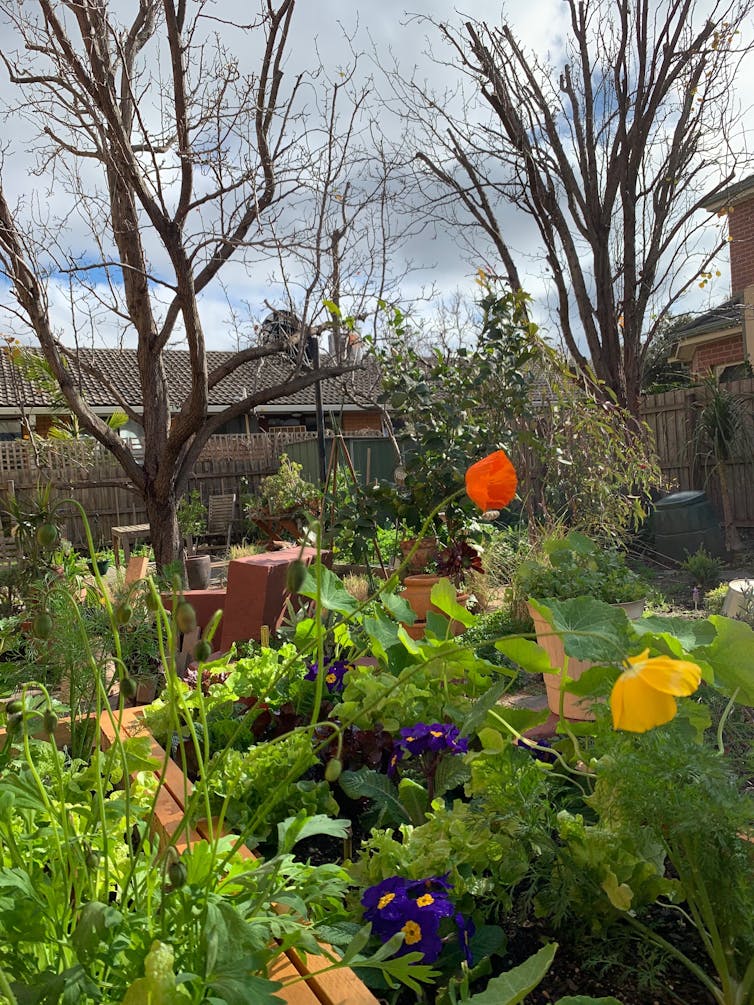
This morning Andrea called me to come and look at our second yellow poppy bursting out from her planter box in the back yard. It stands slender on its hairy stalk, its papery petals a shocking splash of colour against its perfect background, a winter sky.
– ref. Friday essay: on reckoning with the fact of one’s death – https://theconversation.com/friday-essay-on-reckoning-with-the-fact-of-ones-death-143822







